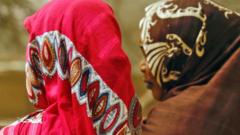In the heart of Sudan's embattled Darfur region, the Zamzam camp, home to over 700,000 displaced individuals, has found itself under relentless assault for a third consecutive day. This humanitarian crisis escalated last week, as brutal attacks left at least 100 civilians dead, including numerous children and medical personnel, according to United Nations reports. Residents describe conditions as "extremely catastrophic" and "dire," struggling under famine-like conditions exacerbated by violence.
The camp, along with Abu Shouk, has provided refuge to those fleeing the ongoing civil war between the army and the Rapid Support Forces (RSF). Humanitarian coordinator Clementine Nkweta-Salami expressed deep dismay at the situation, stating that these attacks represent a horrifying escalation against vulnerable populations and aid workers. Such rising violence tragically coincides with the second anniversary of the civil unrest that began in April 2023.
Relief International has labeled the recent attack a targeted strike on healthcare services, resulting in the assassination of nine of its workers, including doctors integral to the community’s health infrastructure. Survivors from the camp described horrifying scenes, as fear looms over the residents while they await potential further assaults. One person shared despairingly: “Death is everywhere.”
Despite this bleak reality, there remain calls for humanitarian support and international attention to avert further calamities. Yale University's Humanitarian Research Lab revealed that multiple structures within the camp have been set ablaze, symbolizing the destruction brought by escalating hostilities. As the RSF continues to deny responsibility for the civilian casualties, the plight of displaced individuals in Zamzam and across war-torn Sudan appears increasingly dire.
The civil war has not only resulted in significant loss of life but has also forced over 12 million people from their homes, plunging communities into extreme hunger and insecurity. As El-Fasher remains the last army-controlled major town in Darfur, the urgency for peaceful resolution and humanitarian intervention grows stronger each day.
The camp, along with Abu Shouk, has provided refuge to those fleeing the ongoing civil war between the army and the Rapid Support Forces (RSF). Humanitarian coordinator Clementine Nkweta-Salami expressed deep dismay at the situation, stating that these attacks represent a horrifying escalation against vulnerable populations and aid workers. Such rising violence tragically coincides with the second anniversary of the civil unrest that began in April 2023.
Relief International has labeled the recent attack a targeted strike on healthcare services, resulting in the assassination of nine of its workers, including doctors integral to the community’s health infrastructure. Survivors from the camp described horrifying scenes, as fear looms over the residents while they await potential further assaults. One person shared despairingly: “Death is everywhere.”
Despite this bleak reality, there remain calls for humanitarian support and international attention to avert further calamities. Yale University's Humanitarian Research Lab revealed that multiple structures within the camp have been set ablaze, symbolizing the destruction brought by escalating hostilities. As the RSF continues to deny responsibility for the civilian casualties, the plight of displaced individuals in Zamzam and across war-torn Sudan appears increasingly dire.
The civil war has not only resulted in significant loss of life but has also forced over 12 million people from their homes, plunging communities into extreme hunger and insecurity. As El-Fasher remains the last army-controlled major town in Darfur, the urgency for peaceful resolution and humanitarian intervention grows stronger each day.
















